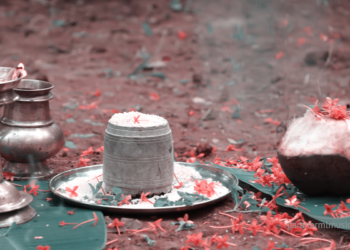Let’s discuss a bit on Death, Rebirth and Evolution from the eastern perspective. The issue of rebirth, or the existence of life after death, has remained an enigma through the ages. Human knowledge is hardly capable of answering and deciphering all the problems that life foreshadows. Gautama Buddha says, “In this world of forms and illusions created by our senses according to our illusions, a man either is or isn’t, either lives or dies. However, in the authentic and formless world, this isn’t. So, does a man live beyond death? I answer No, not in any way restricted to the mind of man which itself expires at death, and if you ask, does a man altogether die at death, I answer no, for what dies is what belongs to the world of illusion and form.”
Yet, the human mind would not allow itself to be puzzled with a vague answer without a comprehensive conclusion. Today we have a perpetual requirement for concrete proof en masse, not of lone prodigies. But if such be the mindset on a profound mystery such as the soul’s transmigration, the obvious answer must be, “Better wait until you die, then you can know.” There appears, therefore, the necessity of a cool, honest, dispassionate and unbiased thought.
The philosophy of Cause and effect -Death, Rebirth and Evolution
The philosophy of Cause and effect and the consequent inevitability of reincarnation have been the foundation of Hindu philosophy. One cannot ignore that the earth has been there for aeons for philosophers to discuss reincarnation. Then the question would arise, if one is to think that his current life is resultant of the actions done in his previous birth, what was it that triggered that preceding birth? And what was the Cause of that birth. ? The cycle continues.
But to answer this, we must fall back upon the law of karma and Evolution. In the distant past, we were once creatures, and from that stratum of existence, we became human beings. However, the question would arise to justify the concept of Cause and effect; there should have been an origin to be born as human beings. As animals don’t have any wisdom to judge between vice and virtue, how would we be held accountable for our birth as human beings? Hypothetically, let’s accept this theory to be accurate, direct ourselves into the household of worms and the vegetable and the mineral kingdoms, and ultimately conclude that God has to have been the first cause accountable. However, believing in the concept of cause and effect, it is beyond reason that God might be unjust.
God can never be held responsible
To hold God responsible as the Cause for all of the suffering, conflict and unhappiness, we have to experience, born as we all are as human beings, seems far from reality.
There is no answer to this question. The best path would be to do good, be good, see good. Follow an ethical and righteous way of living, and leave the rest to God. There are things beyond the orbit of the mind, but the concept of rebirth requires deliberation. There are substantial shreds of evidence and examples to endorse the idea.
Religious Views -Death, Rebirth and Evolution
There’s practically no reference to rebirth or a sinful life or a heavenly concept from the first stages of Vedic literature. Gradually, however, as the Vedic mind progressed, the idea of Cause and effect and transmigration of the soul came into existence.
Different religions introduced social morals and discipline with prospects of hell and heaven to maintain social harmony. Still lot of questions remain. Why do wicked or immoral people prosper? Why does a virtuous person struggle in life?
Hindu concepts believe a man should be accountable for his fate and capable of bettering his own life
The Indian sages offered a better solution and made reincarnation responsible for the evolution of man, who essentially was the master of his destiny. They admit that the creation of the world by God is complex and beyond their knowledge. With that in view, they asserted that God could not be responsible for good and evil, joy and suffering. They felt that man should be accountable for his fate and capable of bettering his own life through self-effort. The concept of reincarnation is, thus, a far more persuasive philosophy.
Furthermore, we have many instances of child prodigy gifted and skilled in their early years. Take another situation where children born of the same parents and brought up in a similar environment can have varied interests and behavioural patterns. The theory of rebirth alone might be the answer to the difference.
Rebirth is life’s sustaining force -Death, Rebirth and Evolution
Even from a material point of view, rebirth is life’s sustaining force. So many dreams, so many eagerly-sought-after ambitions remain unfulfilled. Man ages from an infant to toddler to an adult to old age and carries many desires and cravings. The embers of hope and fulfilment of dreams keep him motivated. Therefore the expectation that he may fulfil his dreams at least in the next birth keeps the theory of reincarnation alive.
Various other schools of thought believe death is the end of life, and the body and soul merge with the five elements into complete oblivion. If this were true, how do we account for the apparitions, exorcism and the experiences of a séance? Hence, Life after Death is a possibility. This takes us to the demeanour of a spiritual aspirant.
The mindset of a spiritual aspirant
Man has a huge potentiality in himself. He’s not the servant of destiny. After Buddha asked Sariputta, one of the most brilliant disciples, to whom the world owes a massive debt for the constitution of Buddhism, “Well, monk, doesn’t life burden you personally and do not you want to get free after death?
Or, does living fascinate you as there is a mission to accomplish.”
Sariputta replied, “Venerable Teacher, I desire no life. I desire no death. I shall wait until my hour comes, like a servant who waits for his wages.”
Effectively this should be the mindset of an aspirant. He has nothing to achieve of his own. His life models according to the will of God. The desire to be born in order to cultivate a worthy religious assignment ought to find no place. No obsession is good; be it spiritual or temporal.
Liberation – The End Goal of Death, Rebirth and Evolution
For a spiritual aspirant, liberation is his end goal. He does not want entrapment in this body of flesh and blood to understand the futility of life. It is better to conquer the mind and cleanse it
Thought determines the action, and activity determines fate. There’s a vast reservoir of power and tremendous potential inside every person. With his indomitable will, man can manoeuvre his life. With the inevitable grace of God, he can model his current life such that there is no rebirth for him. “For the initiated, there isn’t any rebirth?” said sage Dattatreya with unparalleled wisdom.













